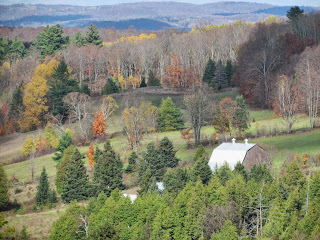 |
| near Schutt |
On any tour through farming country, I still hear dad's voice commenting on slovenly fencelines and poorly stored equipment, or fine fat cattle and good crops. On drives into the north (as central and north Hastings County was known) dad would talk about the "poor farms" and sympathize with the futile efforts of the farmers there. I was awakened to the inequity of land grants, the dishonesty of the colonization road promises, the plain bad luck of farmers taking a stand in this rocky and unforgiving place.

These days, in the hard country of North Hastings county, the resonance is deeper still, as I hear the voice of Al Purdy wherever a turn in the road reveals a tumble-down barn, a log house never replaced by a newer better frame home, a fence going back to the earth, piles of hand-picked stones.
"and where the farms are
it's as if a man stuck
both thumbs in the stony earth and pulled
it apart
to make room
enough between the trees
for a wife
and maybe some cows and
room for some
of the more easily kept illusions-"
"This is the country of our defeat
and yet
during the fall plowing a man
might stop and stand in a brown valley of the furrows
and shade his eyes to watch for the same
red patch mixed with gold
that appears on the same
spot in the hills
year after year
and grow old
plowing and plowing a ten-acre field until
the convolutions run parallel to his own brain-"
"...a little adjacent to where the world is
a little north of where the cities are and
sometime
we may go back there
to the country of our defeat..."
All quotations are from 'The Country North of Belleville', first published in The Cariboo Horses (1965). Only by reading the entire poem, aloud, preferably in a stony North Hastings field, can the power of this most beloved of Purdy's poems be truly appreciated.





No comments:
Post a Comment